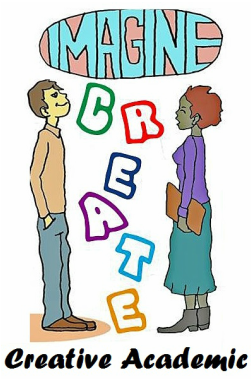Interdisciplinary conversations are a joy to be a part of. The varied role of the imagination in human life and the intentional way it is used by professionals were connective threads in the conversation. Whether a Linguist, Geologist, Scientist, Theatre /Performance/ Visual Art professor, or parent or grandparent, imaginative engagement offers a space for growth, satisfaction, freedom and joy. Thanks to the generosity of participants I now possess a (digital) file stuffed with enticing articles, videos and projects to explore. (Nice image isn’t it? For those of us who lived in the days of real filing cabinets and cardboard files, that metaphor of a bulging file, papers sticking out here and there, totally unruly, will create a powerful image in your mind. Whether intriguing or overwhelming—that stuffed folder is full of possibility.)
Our conversation coincided with World Creativity and Innovation Week and this was one of our contributions to this annual global event.
The Imagination Challenge we posed was particularly interesting to me. The idea of “getting outside” conventions of schooling is a central part of Imaginative Education—as you will read in this volume. But more than metaphorically, I am interested and currently researching how physically getting outside with imagination-focused practices can support learning of the curriculum for all ages. The Walking Curriculum I recently published focuses on the PreK through Grade 12 level. (Note: Physical movement is not essential to the Walking Curriculum—despite the name. The key dimension is the way we are encouraged to learn from the Places we live/learn in ways that support our understanding of curriculum content. Key, too, is getting outside. People of all levels/kinds of mobility can participate.) So, the responses shared for this challenge allowed me to extend my learning into the context of Higher Education.
I think one of the reasons that a Walking Curriculum is being received so well by educators, is that metaphorically, it allows and enables us to do what many of us want to do. And that is “get outside” the norms and routines of school. Another layer: the outdoors—even in urban areas—does inspire. My own work on the Imagination Challenge came from a place of no real idea how to teach a concept outside (the story vs story-form) to feeling like I had come up with something pedagogically valuable. (I have shared the idea with some ex-students—the consensus is overwhelmingly positive that this experiential imaginative task would help teach that concept.) So, there is an appreciation among most educators for the “change of venue” getting outside allows. For that reason alone it is an enjoyable activity!
Ideally, though, there are particular learning outcomes in our Higher Education courses that can be learned more powerfully and evocatively through experience, through participation in the world. This is what I am most interested in and, to understand this better, I hope to continue the conversation around outdoor, Place-based practices in Higher Education. I realize that what participants chose to share this week was likely selected because it was not so subject-specific that readers couldn’t follow. So, examples may have been more “general” than, say, what could have been shared in a conversation uniquely among Physicists or Architects.
Five take-away’s: First, the imagination contributes to all aspects of life—professional (interdisciplinary!), personal, social. In the realm of education I always return to Vygotsky’s quote (below) because in my work I feel at times like I’m swimming upstream—working to convince fellow educators that the imagination is important for learning in all subject areas and grade levels, not just the arts. Imagination isn’t “just for kids”. Imagination matters. Second, imagination is a capacity we all have and the more we work to develop and engage it, the more it can impact us. Third, taking the time to intentionally engage and develop imagination—this week was a week of much what iff’ing for me—pays off not only for ourselves and what we can do with our imagination, but by contributing to a (social/professional) culture in which imagination is given the credit it is due. Four, we can show those around us that we value imagination by giving our colleagues/students actual and ideational space and time to practice using their imaginations, too. And five, imagination is a source of personal and intellectual freedom that makes this wonder-filled world we live in richer and fuller. There’s a joy in it. Especially when you can learn and grow with “your people”- people who care about and appreciate the things that you care about.
Citation
Egan, K. (1992). Imagination In Teaching And Learning: The Middle School Years. Chicago: University of Chicago Press.

 RSS Feed
RSS Feed
